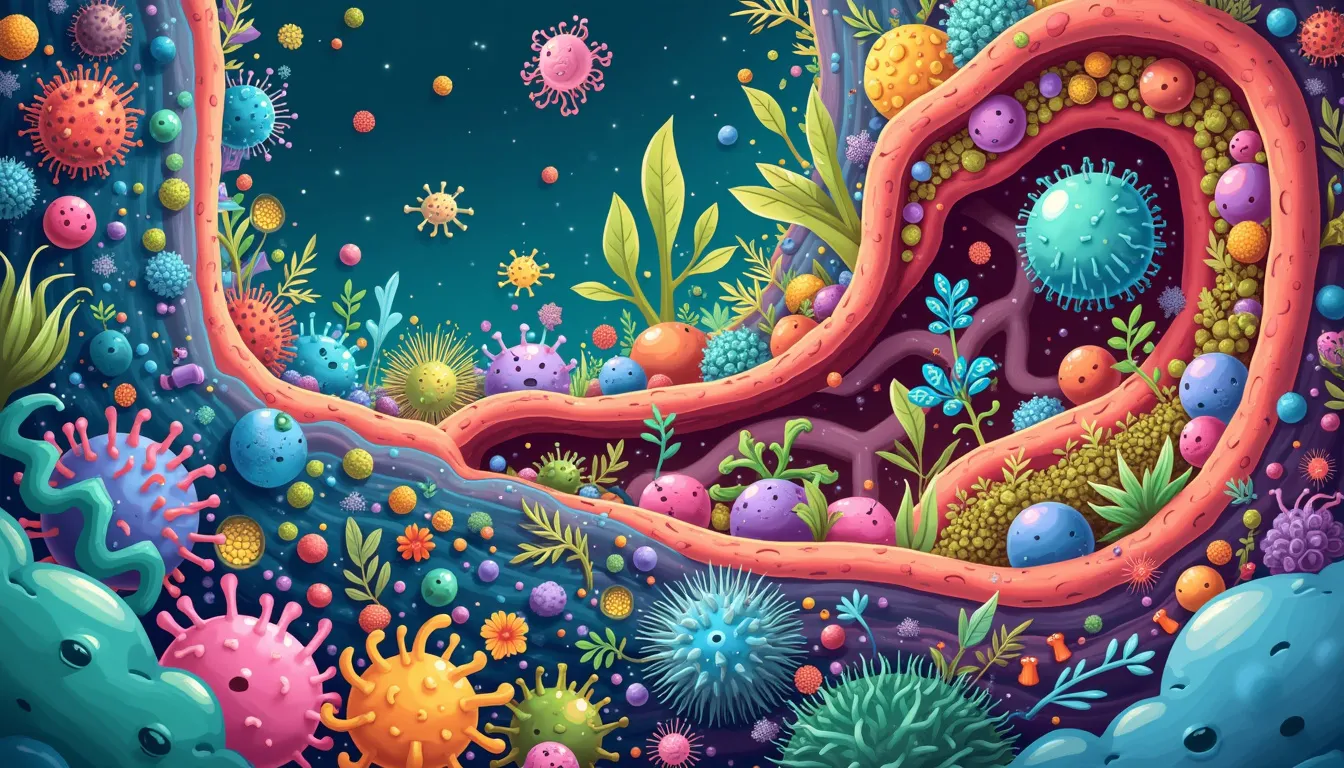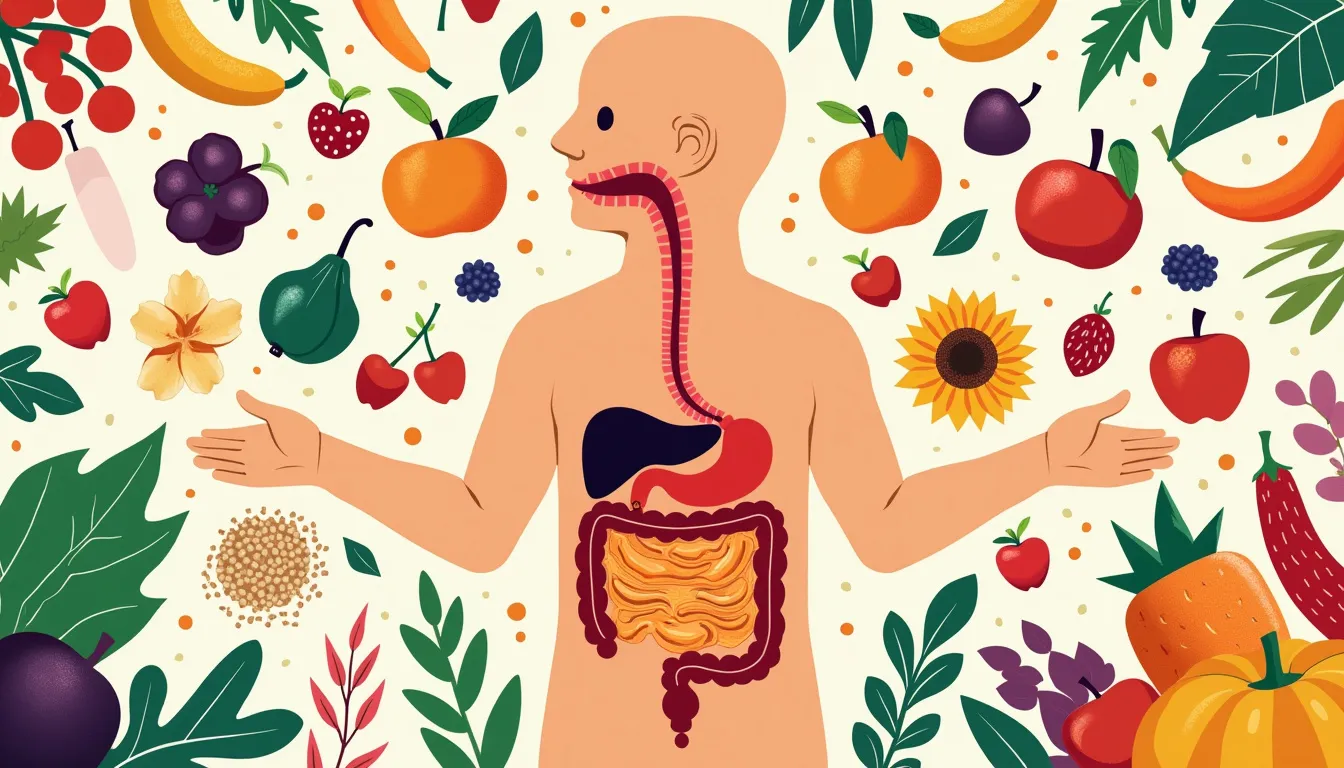The human gut is more than just a conduit for food; it is a complex and dynamic ecosystem that plays a crucial role in our overall health. Often referred to as our body’s hidden powerhouse, gut health encompasses the balance and function of the entire digestive tract, including the gut microbiome—a diverse community of trillions of microorganisms that live within our intestines. This microscopic world not only aids in digestion but also impacts various bodily functions, from immune response to mental well-being. Maintaining a healthy digestive system is essential for optimal health, as imbalances in the gut can lead to a myriad of issues ranging from digestive disorders to chronic diseases.
Understanding the gut microbiome is pivotal in recognizing its importance. This intricate network consists of bacteria, viruses, fungi, and other microorganisms, each playing unique roles. Beneficial bacteria assist in breaking down food, synthesizing vitamins, and protecting against harmful pathogens. Conversely, an overgrowth of harmful bacteria can disrupt this balance and negatively impact our health. Studies have shown the influence of the gut microbiome extends far beyond digestion, affecting conditions such as obesity, diabetes, and even depression.
Several factors influence gut health, with diet and nutrition standing out as primary contributors. Foods rich in fiber, such as fruits, vegetables, and whole grains, promote the growth of beneficial bacteria, while processed foods high in sugar and fat can harm the gut ecosystem. Lifestyle choices, including regular exercise, adequate sleep, and stress management, also play vital roles. The use of medications like antibiotics can drastically alter the gut flora, underlining the importance of cautious and informed use of such drugs. Environmental factors, including pollution and hygiene, further contribute to the health of our gut microbiome.
To improve and maintain gut health, incorporating dietary recommendations such as prebiotics and probiotics is beneficial. Prebiotics, found in foods like garlic, onions, and bananas, serve as food for beneficial bacteria, while probiotics, present in fermented foods like yogurt and kimchi, add live beneficial microbes to the gut. Supplements may also play a role in supporting gut health. Adopting healthy lifestyle habits, such as regular physical activity and effective stress management techniques, can further enhance gut function. In certain cases, medical interventions may be necessary, and seeking professional advice ensures personalized and effective treatment. By understanding and nurturing our gut health, we unlock the potential for improved overall well-being and longevity.
Introduction to Gut Health
Your gut, often referred to as the second brain, plays a crucial role in your overall well-being. Gut health encompasses the function and balance of bacteria throughout the gastrointestinal tract. A healthy gut is essential for effective digestion, nutrient absorption, and immune function. Furthermore, recent research has revealed its significant impact on mental health, illustrating how intertwined our bodies’ systems truly are.
Definition and Significance of Gut Health
Gut health is a term that describes the equilibrium and functionality of bacteria and other microorganisms in the digestive tract. This system includes various parts such as the stomach, small intestine, and colon, which house trillions of microbes collectively known as the gut microbiome. Maintaining a healthy gut means ensuring that these microorganisms are balanced, supporting digestion, and protecting against pathogens.
The significance of gut health cannot be overstated. It impacts numerous bodily functions, from digesting food and absorbing nutrients to producing essential vitamins like B12 and K. Additionally, around 70% of the immune system resides in the gut, highlighting its pivotal role in disease prevention. Research continues to reveal new connections between gut health and conditions such as obesity, diabetes, heart disease, and even mental disorders like anxiety and depression.
Brief Overview of the Gut Microbiome
The gut microbiome comprises a vast community of microorganisms, including bacteria, viruses, fungi, and other microbes. These microscopic entities coexist in a delicate balance, contributing to various physiological processes. The human gut can harbor more than 1,000 different species of bacteria, each with specific functions that contribute to our health. Notable bacteria include Bacteroides, prevalent in breaking down complex molecules in plants, and Firmicutes, involved in energy absorption and metabolism.
Interestingly, the gut microbiome is as unique as a fingerprint. Influenced by factors like diet, environment, and genetics, no two individuals share the same microbial composition. This uniqueness suggests personalized approaches might be necessary for optimal gut health. Studies have shown that diversifying the gut microbiome, often through dietary variety and minimizing the use of antibiotics, can foster a more resilient digestive system.
Importance of Maintaining a Healthy Digestive System
Maintaining a healthy digestive system is fundamental to overall health. A well-functioning gut ensures efficient digestion, seamless nutrient absorption, and the elimination of waste products. Disruptions in these processes, often manifesting as bloating, constipation, or diarrhea, can significantly impact one’s quality of life.
Moreover, an imbalanced gut microbiome, also known as dysbiosis, can lead to a cascade of health issues. Dysbiosis has been linked to inflammatory bowel diseases such as Crohn’s disease and ulcerative colitis. Additionally, conditions like irritable bowel syndrome (IBS) are increasingly being understood in the context of the gut-brain axis, a bidirectional communication pathway between the gut and the central nervous system.
Emerging research also points to the gut’s role in mental health. The gut-brain axis involves intricate signaling between gut bacteria and the brain. Certain gut microbes facilitate the production of neurotransmitters such as serotonin, often dubbed the feel-good hormone. Thus, a healthy gut can contribute to improved mood and cognitive function.
Given its multifaceted roles, maintaining a balanced gut microbiome through lifestyle choices, dietary habits, and mindful use of medications is crucial. Simple practices like incorporating a variety of fiber-rich foods, staying hydrated, and engaging in regular physical activity can significantly enhance gut health.
In summary, understanding and supporting gut health is paramount. A thriving gut microbiome not only underpins effective digestion and robust immunity but also extends its influence to mental health and beyond. By prioritizing gut health, individuals can foster resilience against a myriad of diseases, paving the way for a healthier, more vibrant life.

The Gut Microbiome: A Key Player
The gut microbiome is an intricate ecosystem within our digestive system, consisting of trillions of microbes, including bacteria, viruses, fungi, and other microorganisms. This complex community forms a symbiotic relationship with our bodies, significantly influencing our health.
Components of the Gut Microbiome
Bacteria are the predominant constituents of the gut microbiome, with numerous species classified into roughly 1,000 different species. The two most common bacterial phyla are Firmicutes and Bacteroidetes. These bacteria coexist with archaea, viruses, and fungi, contributing to the microbiome’s diversity and functionality.
Roles and Functions of Different Gut Bacteria
The gut microbiome plays several crucial roles in maintaining overall health, particularly through its diverse array of bacteria. Understanding these roles provides insight into their significance:
- Digestion and Nutrient Absorption: Certain gut bacteria produce enzymes that aid in breaking down complex carbohydrates, proteins, and fats, enabling the absorption of vital nutrients. For instance, Bacteroides helps break down complex carbohydrates and fibers, which are otherwise indigestible by human enzymes alone.
- Synthesizing Essential Vitamins: Gut bacteria are instrumental in synthesizing essential vitamins such as vitamin K and certain B vitamins (e.g., B12, folate). These vitamins play vital roles in processes like blood clotting (vitamin K) and energy production (B vitamins).
- Metabolism Regulation: Microbes in the gut influence metabolic processes, including fat storage and glucose metabolism. Studies indicate that the balance between Firmicutes and Bacteroidetes can affect body weight and obesity development.
- Immune System Modulation: The gut microbiome acts as a critical component of the immune system, helping to develop and regulate immune responses. It offers protection against pathogens by competing for resources and producing antimicrobial substances.
- Maintaining Gut Barrier Integrity: By strengthening the gut lining, beneficial bacteria prevent harmful substances from entering the bloodstream, thereby reducing inflammation and supporting overall gut health.
Influence of the Gut Microbiome on Overall Health and Diseases
The gut microbiome’s impact extends beyond the digestive system, influencing various aspects of overall health and contributing to the pathogenesis of several diseases. Evidence suggests that an imbalanced gut microbiome, or dysbiosis, can affect various systems in the body:
Metabolic Health
An imbalanced gut microbiome has been linked to metabolic disorders such as obesity, type 2 diabetes, and metabolic syndrome. Dysbiosis can disrupt insulin sensitivity and glucose metabolism, contributing to these conditions. A 2013 study published in Nature found that obese individuals had a lower diversity of gut bacteria compared to lean individuals, suggesting a connection between gut microbiota composition and metabolic health.
Mental Health
The gut-brain axis represents the bidirectional communication between the gut microbiome and the brain. This interaction can affect mood, stress responses, and cognitive function. Research has shown that gut bacteria produce neurotransmitters like serotonin, which influences mood regulation. For example, a study in Gastroenterology (2019) highlighted the potential of certain probiotics to alleviate symptoms of anxiety and depression, underscoring the gut’s influence on mental health.
Immune Health
Given that a significant portion of the immune system resides in the gut, the microbiome’s influence on immune function cannot be overstated. An imbalance in gut bacteria has been associated with autoimmune diseases such as Crohn’s disease, ulcerative colitis, and rheumatoid arthritis. A 2012 study published in Nature illustrated that gut microbiota alterations could exacerbate inflammation, contributing to these autoimmune conditions.
Cardiovascular Health
Emerging research suggests that the gut microbiome may also impact cardiovascular health. Certain gut bacteria produce metabolites like trimethylamine N-oxide (TMAO), which has been associated with a higher risk of cardiovascular diseases. A study in Cell (2016) demonstrated the relationship between gut microbial composition and TMAO levels, highlighting the microbiome’s potential role in heart health.
Gastrointestinal Disorders
Unsurprisingly, dysbiosis is closely linked to various gastrointestinal disorders. Conditions such as irritable bowel syndrome (IBS), inflammatory bowel disease (IBD), and colorectal cancer have been associated with an imbalanced gut microbiome. For example, a meta-analysis published in Gastroenterology (2020) noted significant differences in the microbial profiles of IBD patients compared to healthy individuals, illustrating the microbiome’s role in gut health disorders.
Overall, the gut microbiome remains a frontier in medical research, revealing its extensive implications for our health. By understanding the components and functions of the gut microbiome, we can better appreciate its integral role in maintaining health and preventing diseases.

Factors Affecting Gut Health
Diet and Nutrition: Foods that Promote or Harm Gut Health
Diet plays a crucial role in maintaining gut health. Consuming a diet rich in fruits, vegetables, whole grains, and lean proteins can foster a diverse and beneficial gut microbiome.
- Fibrous Foods: Dietary fiber, found in foods such as vegetables, beans, and whole grains, serves as a food source for beneficial gut bacteria. These fibers are fermented in the colon, producing short-chain fatty acids (SCFAs) that nourish the gut lining and inhibit the growth of harmful bacteria.
- Fermented Foods:Foods like yogurt, kefir, sauerkraut, and kimchi contain live cultures of beneficial bacteria, which can help diversify and promote a healthy microbiome.
- Processed Foods and Sugars: Diets high in refined sugars, artificial sweeteners, and processed foods can negatively impact gut health by promoting the growth of harmful bacteria and reducing microbial diversity.
Lifestyle Factors: Exercise, Sleep, and Stress
Lifestyle choices significantly influence gut health. Regular physical activity, adequate sleep, and stress management are fundamental to maintaining a balanced microbiome.
- Exercise: Consistent physical activity has been shown to enhance the diversity of gut bacteria. Studies indicate that exercise can increase levels of SCFAs, which have anti-inflammatory properties and support gut health.
- Sleep: Adequate sleep is critical for gut health. Research suggests that sleep deprivation can alter the balance of the gut microbiome, leading to increased inflammation and susceptibility to infections.
- Stress Management: Chronic stress can negatively affect gut health, leading to disorders such as irritable bowel syndrome (IBS). Techniques such as mindfulness, meditation, and deep-breathing exercises can help mitigate stress levels and promote gut health.
Use of Medications: Antibiotics and Probiotics Impact
Medications, particularly antibiotics, can have profound effects on gut health. While antibiotics are essential for treating bacterial infections, they can indiscriminately kill beneficial bacteria, disrupting the gut microbiome.
- Antibiotics: It’s well-documented that antibiotics can lead to a significant reduction in microbiome diversity. This disruption can create opportunities for opportunistic pathogens to thrive, potentially leading to conditions like Clostridioides difficile infection.
- Probiotics: Taking probiotics (supplements containing beneficial bacteria) can help restore gut microbiota following antibiotic treatment. Probiotics are also beneficial for maintaining gut health, as they can repopulate and support the growth of healthy gut bacteria. However, the effectiveness can vary depending on the strain and individual health conditions.
Environmental Influences: Pollution and Hygiene
The environment we live in also has an impact on our gut microbiome. Factors such as pollution and hygiene practices play a role in shaping gut health.
- Pollution: Exposure to environmental pollutants, such as heavy metals and particulate matter, can alter the composition and function of the gut microbiome. Studies have linked air pollution to changes in gut microbial communities and increased inflammation.
- Hygiene Hypothesis: This hypothesis suggests that overly sterile environments, particularly in early life, may impair the development of a balanced immune system and gut microbiota. It’s posited that limited exposure to benign microorganisms may contribute to allergic diseases and autoimmune disorders. Encouraging safe, balanced exposure to diverse microbial environments can promote a healthy gut.
By understanding and addressing these factors, individuals can take proactive steps toward optimizing their gut health, which in turn supports overall well-being.

Ways to Improve and Maintain Gut Health
Maintaining a healthy gut is essential for overall well-being. Here, we explore various strategies to promote and sustain optimal gut health, focusing on practical steps that individuals can incorporate into their daily lives.
Dietary Recommendations: Prebiotics and Probiotics
Diet plays a crucial role in gut health. The inclusion of prebiotics and probiotics in one’s diet can significantly enhance the gut microbiome.
Prebiotics are non-digestible food components that beneficially affect the host by selectively stimulating the growth and/or activity of beneficial gut bacteria. Foods rich in prebiotics include:
- Garlic
- Onions
- Leeks
- Asparagus
- Bananas
- Whole grains
Prebiotics act as food for probiotics, aiding their growth and function.
Probiotics are live bacteria that provide health benefits when consumed in adequate amounts. These good bacteria help balance the gut microbiome. Common dietary sources of probiotics include:
- Yogurt with live cultures
- Kefir
- Sauerkraut
- Kimchi
- Miso
- Tempeh
Supplements and Fermented Foods
In addition to natural food sources, supplements can be an effective way to ensure a steady intake of prebiotics and probiotics. It’s important, however, to choose high-quality supplements from reputable brands.
Fermented foods, which undergo a controlled process of lacto-fermentation, are particularly beneficial. This process not only extends the shelf life and enhances the flavor of foods but also creates probiotics. Some widely recommended fermented foods include:
- Kombucha
- Natto
- Pickles (fermented in saltwater brine)
Fermentation promotes the growth of beneficial bacteria, contributing to a healthier gut environment.
Healthy Lifestyle Habits: Regular Exercise and Stress Management
Beyond diet, lifestyle factors can profoundly influence gut health.
Regular exercise has been shown to positively impact the gut microbiome. Physical activity increases the diversity of gut bacteria, which is linked to better health outcomes. Activities such as walking, jogging, cycling, and swimming are all beneficial.
Stress management is another crucial aspect. Chronic stress can disrupt the balance of gut bacteria, leading to issues such as increased intestinal permeability. Techniques to manage stress include:
- Meditation
- Yoga
- Deep-breathing exercises
- Progressive muscle relaxation
Incorporating these practices can help maintain a balanced gut microbiome.
Medical Interventions: When to Seek Professional Advice
While lifestyle modifications are vital, there are situations where professional medical advice is necessary. Symptoms such as persistent digestive discomfort, unexplained weight loss, and severe abdominal pain may indicate underlying issues that require medical attention.
A healthcare provider may recommend specific treatments based on the diagnosis, including:
- Prescription probiotics for targeted bacterial colonization
- Specific dietary changes tailored to individual needs
- Advanced therapies for conditions like inflammatory bowel disease (IBD) or irritable bowel syndrome (IBS)
It’s essential to approach gut health comprehensively, balancing diet, lifestyle, and professional guidance when needed.
Maintaining gut health involves a multifaceted approach. By understanding and implementing dietary changes, embracing a healthier lifestyle, and seeking medical advice when necessary, individuals can support and enhance their gut microbiome, contributing to their overall health and well-being.
In conclusion, the importance of maintaining optimal gut health cannot be overstated. Our understanding of the gut as a pivotal component of overall health continues to grow, substantiating its description as the body’s hidden powerhouse. The gut microbiome, composed of a diverse array of bacteria and other microorganisms, plays a crucial role in various bodily functions including digestion, immune response, and even mental health. It is evident that a balanced and healthy gut microbiome contributes significantly to preventing diseases and promoting general well-being.
Various factors influence gut health, with diet and nutrition playing a primary role. Consuming a diet rich in fiber, prebiotics, and probiotics supports a thriving gut microbiome, while highly processed foods, excessive sugar, and unhealthy fats can be detrimental. Lifestyle factors such as regular exercise, adequate sleep, and effective stress management are also integral to maintaining a healthy gut. The use of medications, particularly antibiotics, should be approached judiciously, as they can significantly alter the gut microbiota. Environmental factors, including pollution and hygiene practices, further underscore the complexity of gut health.
To improve and sustain gut health, adopting dietary habits that incorporate prebiotics and probiotics is beneficial. Natural sources such as yogurt, sauerkraut, and other fermented foods can be particularly effective. Supplementation may also be considered, particularly for individuals with specific dietary restrictions or health conditions. Additionally, embracing healthy lifestyle habits, such as regular physical activity and efficient stress management techniques, can offer substantial support to gut health. Recognizing when professional medical advice is needed—such as in cases of persistent gastrointestinal issues—ensures timely and appropriate interventions.
By integrating these practices into daily life, individuals can harness the full potential of their gut microbiome, fostering a foundation for better health and resilience. As research in this field evolves, our strategies for optimizing gut health will continue to refine, providing further insights into this intricate and vital aspect of human health.
